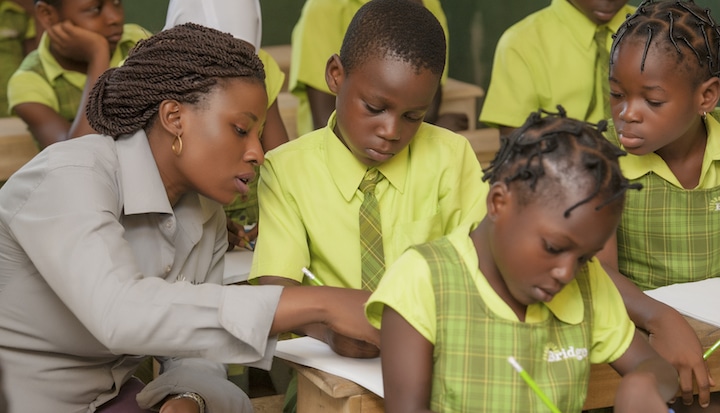The UK Department for International Development (DFID) has published a report in Nigeria which shows full equality of learning in Bridge International Academies classrooms, regardless of a child’s socioeconomic background. It is a strong endorsement of DFID’s commitment to innovative private sector roles in improving service and opportunity for these families. Even though the report was based on Bridge schools in Nigeria, the findings clearly have relevance in a Kenyan context where the social enterprise runs hundreds of schools educating tens of thousands of children in some of Kenya’s poorest communities.
The DFID findings build on the preponderance of evidence demonstrating that the methods used and support provided by Bridge to teachers and pupils leads to higher learning than the alternatives.
DFID Nigeria has “welcomed the findings of the independent study that show the need to build the regulatory capacity of government to support school management systems and processes that are necessary for improved learning outcomes in both public and private schools.” they added “this study will contribute to the growing body of evidence on the role of private sector provision of education in sub-Saharan Africa”
The study makes clear that at Bridge schools, and only at the Bridge schools, parents’ income and education was not correlated to children’s learning outcomes. This is a landmark finding – demonstrating that children from even the poorest families attain the same learning as those that are better off, if the child attends Bridge. This is what we should always find at every school – that the school itself is ensuring that each child, regardless of family background, can achieve their full potential. The DFID findings contradict decades of global education research trends from Coleman’s landmark 1966 study of academic outcomes among US students to OECD’s 2016 global study of excellence and equity in education, asserting family background matters more, perhaps much more, than the differences between the schools students attend. The finding of equity in learning at Bridge is groundbreaking.
A spokesperson for DFID Nigeria said DFID “welcomed the findings of the independent study that show the need to build the regulatory capacity of government to support school management systems and processes that are necessary for improved learning outcomes in both public and private schools.” they added “this study will contribute to the growing body of evidence on the role of private sector provision of education in sub-Saharan Africa”
A report author, Alina Lipcan, from Oxford Policy Management, said: “Good management matters, we find a strong correlation with better learning outcomes. We would recommend more programmes focused on better management, so that more schools and pupils can benefit.”
Other highlights from the report’s findings include:
- A child’s family background has no correlation to their attainment
- Overall, Bridge pupils know more than their peers.
- The majority of children in Bridge schools are from poor families
- Bridge teachers have the best relationships with their pupils
- Bridge schools are managed more effectively than other types of schools
The Vice President of Measurement and Evaluation at Bridge, Dr. Steven Cantrell, highlights: “There is no learning gap at Bridge schools. This is a big deal. This study validates our methods, which ensure that all teachers have high expectations for every pupil, irrespective of their families income, prior educational attainment, or which language they speak at home. Bridge schools are places of equal opportunity and equal learning benefits for all types of children, and especially for the poor. Overall, this independent report shows that Bridge is helping children from poor families to learn, improving access to quality education, and enabling the best overall learning attainment in the local communities we serve. We can now say with total confidence that Bridge makes a significant and important overall contribution to education opportunities.
The report marks an important milestone in the debate around Bridge’s role in helping poor families access quality education. The UK Government now recognises that “the private sector, as well as the public sector, contributes to the provision of high quality education and that DFID therefore needs to work with the private sector as well as the public sector to improve education outcomes for children”. Recently, the UK Secretary of State for International Development, Penny Mordaunt, said, “We have tackled the dogma and culture that still exists in some parts of the aid sector, which not only sees organisations failing to put the beneficiaries first but also preventing the private sector from helping deliver those global goals.” The CEO of the IFC, Philippe Le Houérou, supported this view at the World Bank annual meetings in Bali last week, saying that: “We need to be imaginative and find new and more creative public-private solutions and, in many countries the governments are seeing the potential of working with the private sector.”
The new findings from DFID will only add to the evidence that it is possible to make schools equal playing fields and ensure that no child is left behind.










